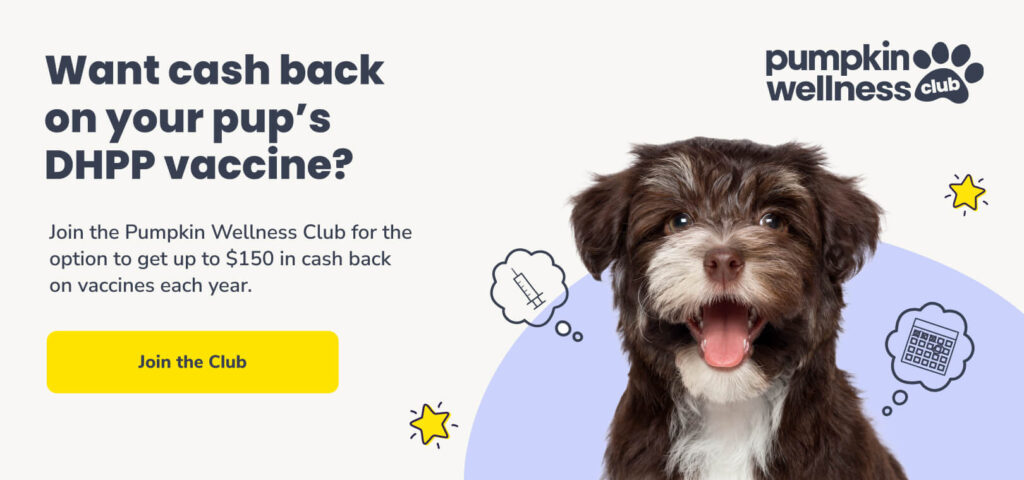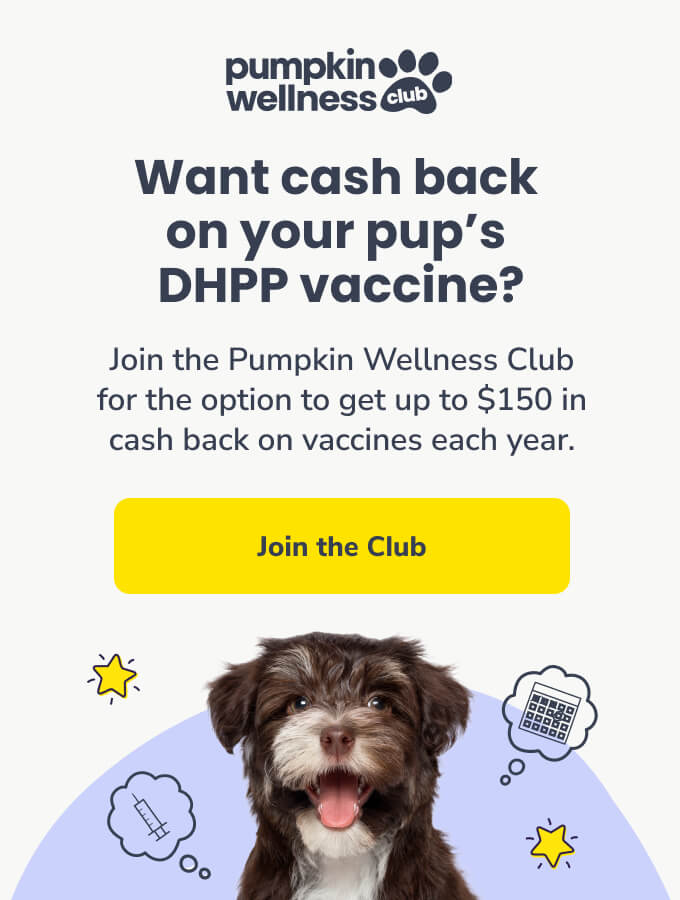Key Points:
- The DHPP vaccine can protect your dog from several life-threatening diseases including distemper, hepatitis, parvovirus, and parainfluenza.
- Puppies need 2-3 initial DHPP vaccinations, followed by a one-year booster and additional boosters every three years after that.
- Pumpkin Wellness Club* can help you save on your dog’s routine preventive care, including the DHPP vaccine, with cash payments and access to special discounts on top pet brands.
You likely know that taking your dog to the veterinarian annually is important to keep your dog healthy and prevent disease. During your pup’s wellness visit, your veterinarian will examine your dog; check and treat for parasites; discuss nutrition, exercise, and mental well-being; and administer vaccines to protect against infectious diseases.
Most veterinarians recommend the combination DHPP vaccine, which protects against several diseases that could seriously sicken your dog. This article will give you everything you need to know about the DHPP vaccine so you can make informed decisions for your dog’s health: what it is, how it works, possible side effects, and how much you can expect to spend on vaccination and necessary boosters.
If you’re concerned about the cost of annual check-ups and vaccinations, the Pumpkin Wellness Club is designed to help health-conscious pet parents pay for the routine preventive care pets need to stay healthy and disease-free. Members can get up to $150 in cash for vaccinations each year, which is enough to cover the cost of the DHPP vaccine and then some.
Now that we’ve discussed the dollar signs, let’s dive into the details of this life-saving vaccine.
What is the DHPP vaccine for dogs?
Next to the rabies vaccine, the DHPP combination vaccine is one of the important vaccines that your dog will receive because it protects against several life-threatening infectious diseases. The vaccine protects against 4 separate infectious diseases:
- Distemper
- Hepatitis
- Parainfluenza
- Parvovirus
Distemper
Canine distemper virus is a highly contagious and often fatal airborne virus that is spread by coughing and sneezing. Dogs are typically infected when they inhale the virus that is shed by infected dogs. Distemper causes coughing, sneezing, fever, thickening of nose and foot pads, fever, gastrointestinal problems, and can also damage the nervous system.
Hepatitis
Canine adenovirus type 2 (abbreviated A2 or CAV-2) protects against infectious canine hepatitis and canine respiratory disease syndrome. Distemper combination vaccines that contain adenovirus type 2 are either called DHPP or DA2PP.
Parvovirus
Canine parvovirus is a life-threatening and highly contagious virus that causes severe vomiting, bloody diarrhea, and dehydration. Parvovirus also attacks the immune system. Parvovirus is highly fatal if untreated in puppies.
Parainfluenza
Canine parainfluenza virus is a contagious virus that causes a hacking cough, nasal discharge, fever, and malaise in dogs. Parainfluenza is one of the infectious disease agents implicated in kennel cough.
How does the DHPP vaccine work?
The DHPP recombinant vaccine is a modified live vaccine. In a nutshell, modified-live vaccines help dogs build immunity by exposing them to a tiny amount of a version of the viruses that will teach a dog’s immune system how to fight off the virus without actually making them sick. Once the vaccine is administered, the viruses replicate within the dog’s system, creating an opportunity for the immune system to mount a response.
Because modified live vaccines contain a live, weakened version of the virus, they have to be handled more carefully than killed vaccines. They typically come in freeze-dried powder form that has to be reconstituted with a liquid that is provided in a second vial. These vaccines are more sensitive to light and heat and must be carefully handled and stored to avoid inactivation. This is why it is recommended to get these vaccines from a veterinary provider to ensure that you are getting a product that has been handled and stored correctly.
How often does a dog need a DHPP vaccine?
The American Animal Hospital Association has established the following standard vaccine protocol recommendations for dogs:
- Dogs less than 16 weeks of age: at least 3 doses of DHPP vaccine between 6-16 weeks of age, 2-4 weeks apart
- Dogs over 16 weeks of age with no vaccine history: 2 doses of DHPP vaccine, 2-4 weeks apart
- Adult dogs: 1 dose of DHPP vaccine one year after initial vaccine series, then one dose (booster) every 3 years
Puppies receive more doses of the vaccine than adult dogs because maternal antibodies from colostrum can interfere with the vaccine.
Adult dogs that have not received any vaccines receive two doses because the initial dose primes the immune system to create antibodies and the second dose creates enough antibodies to be considered protective against the viruses.
Is it necessary to get the DHPP vaccine for my dog?
Unlike the rabies vaccine, DHPP is not required by law. Distemper, hepatitis, and parvovirus are, however, considered core vaccines by the American Animal Hospital Association and veterinarians as a whole, which means that it is recommended for all healthy dogs unless they have a specific medical condition that prevents vaccination, such as severe vaccine reactions or medically fragile due to sickness or advanced age.
If your dog falls into one of these categories, talk to your veterinarian about options. Parainfluenza is not considered a core vaccine, but to reduce the number of times a dog is poked with a needle, most vets prefer to have parainfluenza combined with distemper, hepatitis, and parvovirus in the DHPP vaccine.
Beyond the fact that the DHPP vaccine is one of the best ways to protect your dog against these infectious diseases, you may find that most of the group activities you would like your dog to participate in, such as doggie daycare, group training, or boarding your dog will require you to show proof that your dog’s DHPP vaccine is up to date. This is to prevent outbreaks at canine boarding or training facilities.
While pet owners may choose to decline the DAPP vaccine, vaccinating your dog appropriately with DHPP is a cornerstone of veterinary preventive healthcare and one of the most cost-effective ways to prevent infectious disease in your dog and other dogs.
Are there any adverse reactions associated with the DHPP vaccine?
All vaccines run the risk of adverse reactions, but veterinarians and organizations like AAHA and the AVMA agree that the benefits of vaccines outweigh the risks. The DHPP vaccine has short-term side effects that can include:
- Fever
- Tender at the injection site
- Swelling at the injection site
- Low energy
- Loose stool
- Loss of appetite
These short-term symptoms show that the vaccine is actually doing its job of engaging the immune system and making antibodies. If you notice that these side effects last longer than 48 hours, or if your dog is acting especially sore, contact your veterinarian.
Sick dogs, dogs with a fever, or dogs with known auto-immune conditions should not receive any vaccinations. Serious but rare adverse vaccine reactions include:
- Above symptoms lasting longer than 48 hours
- Limping
- Vomiting
- Diarrhea
- Hives, facial swelling
- Difficulty breathing
- Seizures
It’s important to remember that a vaccine like DHPP is administered to millions of dogs every year without any negative side effects thoroughly tested for safety and has been used successfully to prevent deadly infectious diseases for decades. When an individual dog has an adverse reaction to a DHPP vaccine that means that the dog’s system is hyperreactive and having an allergic reaction; it doesn’t mean there is a problem with the vaccine.
In regards to over-vaccination concerns, modern vaccine protocols strive to reduce over-vaccination by continuing research in vaccine-protection longevity and revising vaccine schedules as vaccine technology and our knowledge of immunity improves.
How much does the DHPP vaccine cost?
DHPP vaccines typically cost between $20-$45 per dose. This does not include the cost of an office visit with a veterinarian. You can save money on your pup’s vaccinations by enrolling in a wellness plan that covers vaccines. Alternatively, if your dog only needs a booster and nothing else, you can ask your veterinary office for a veterinary technician appointment to get the booster (and not see the doctor) or get your dog vaccinated at a shelter or low-cost vaccine clinic.
You can also get paid for your pup’s vaccinations and other important preventive care services, like annual checkups and routine fecal and blood tests, by joining the Pumpkin Wellness Club. Members not only get up to $150 in cash for vaccinations every year, but also can save up to $360 annually between routine care, access to a 24/7 Pet Health Helpline, and special discounts on top pet brands.
When considering your dog’s health, it is important to remember to protect them against viral infectious diseases to the best of your ability. While you can’t always prevent exposure to distemper or parvovirus, you can reduce the likelihood of your dog becoming sick or spreading the disease by vaccinating your dog appropriately against the disease.
DISCLOSURE






